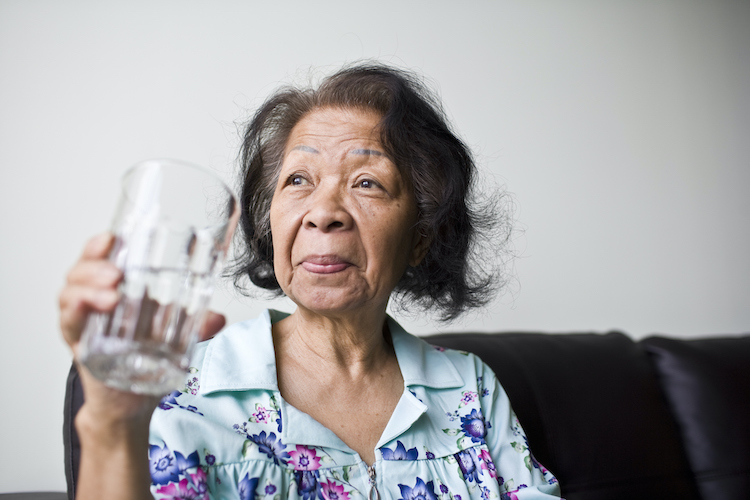
The elderly and dehydration can be a hazardous mix.
During the hottest time of the year, maintaining proper hydration is necessary, especially for older adults. As a matter of fact, close to 1/2 of all older adults are chronically under-hydrated, according to a recently available UCLA study, which can lead to an assortment of health problems, such as kidney stones, urinary tract infection, and in some cases an increased risk for falls.
It’s important to know that the elderly and dehydration can be a hazardous mix. The frequency of dehydration in older adults is associated with a variety of factors, most notably:
- A reduced amount of water naturally taking place in aging bodies
- Medication side effects
- Less sensitivity to the feeling of thirst
- A decreased ability to maintain an adequate fluid level balance in the body
- Reduced efficiency in the kidneys
- And more
There’s a quick calculation to identify exactly how much water an older adult should drink each day. Take the individual’s body weight in pounds, and drink one-third that many ounces of water every day. A person who weighs 120 pounds, for instance, should drink at minimum 40 ounces of water – about five 8-ounce glasses.
Time is critical in ensuring hydration in seniors, as it is much easier to fix mild dehydration prior to it becoming more serious. Symptoms include:
Minor Dehydration:
- Decreased, darker-colored urine
- Dry mouth
- Dizziness and fatigue
- Muscle cramping
- Irritability
- Headaches
Severe Dehydration:
- Disorientation and confusion
- Trouble with walking
- Weak, fast pulse
- Low blood pressure levels
- Worsening muscle cramps
- Sunken, dry eyes
- Skin that is wrinkled and has reduced elasticity
- Bloating
- Quickened breathing
- Convulsions
Seek out medical help as soon as possible if you suspect dehydration in a senior, to circumvent severe health complications which could develop rapidly.
In the event a senior loved one resists drinking adequate amounts of water, try flavoring the water or offering juice, if it’s a suitable part of the older adult’s dietary plan. For individuals with conditions such as diabetes or obesity, the sugar content in juice could be dangerous. In some cases, modifying the temperature of the beverage makes it more appealing as well, such as warming up a cup of water with a little lemon to sip on in the morning, and then offering cold water over crushed ice during the afternoon.
The key is to have fluids available ongoing throughout the day. Geriatric nurse Anne Vanderbilt, CNS, explains, “What I often see in our advanced older adults – people in their 80s and 90s – is that they can’t sit down and drink a full 8-ounce glass of water. It fills them up, causes bloating and then makes them have to run to the bathroom. So little sips throughout the day are better.”
In order to help ensure the older adults you love are remaining hydrated and healthy, partner with Hearts at Home In-Home Care for expert in home care in Kansas City. Our caregivers are readily available to help monitor fluid intake, prepare nourishing meals, encourage seniors to stay physically active, and so much more for optimal wellbeing. Email or give us a call at 913-440-4209 for a complimentary in-home evaluation and to find out more about our top-rated in home care in Kansas City and the surrounding communities.
